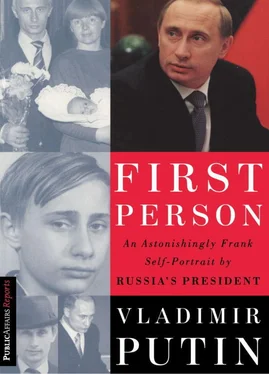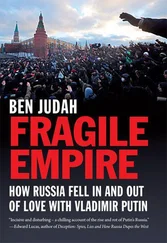Vladimir Putin - First Person
Здесь есть возможность читать онлайн «Vladimir Putin - First Person» весь текст электронной книги совершенно бесплатно (целиком полную версию без сокращений). В некоторых случаях можно слушать аудио, скачать через торрент в формате fb2 и присутствует краткое содержание. Город: New York, Год выпуска: 2000, ISBN: 2000, Издательство: PublicAffairs, Жанр: Биографии и Мемуары, Политика, Политика, Публицистика, на английском языке. Описание произведения, (предисловие) а так же отзывы посетителей доступны на портале библиотеки ЛибКат.
- Название:First Person
- Автор:
- Издательство:PublicAffairs
- Жанр:
- Год:2000
- Город:New York
- ISBN:978-0-786-72327-0
- Рейтинг книги:3 / 5. Голосов: 1
-
Избранное:Добавить в избранное
- Отзывы:
-
Ваша оценка:
- 60
- 1
- 2
- 3
- 4
- 5
First Person: краткое содержание, описание и аннотация
Предлагаем к чтению аннотацию, описание, краткое содержание или предисловие (зависит от того, что написал сам автор книги «First Person»). Если вы не нашли необходимую информацию о книге — напишите в комментариях, мы постараемся отыскать её.
First Person — читать онлайн бесплатно полную книгу (весь текст) целиком
Ниже представлен текст книги, разбитый по страницам. Система сохранения места последней прочитанной страницы, позволяет с удобством читать онлайн бесплатно книгу «First Person», без необходимости каждый раз заново искать на чём Вы остановились. Поставьте закладку, и сможете в любой момент перейти на страницу, на которой закончили чтение.
Интервал:
Закладка:
There were other pensioners living in our apartment as well, although they weren’t there long. They played a role in my baptism. Baba Anya was a religious person, and she used to go to church. When I was born, she and my mother had me baptized. They kept it a secret from my father, who was a party member and secretary of the party organization in his factory shop.
Many years later, in 1993, when I worked on the Leningrad City Council, I went to Israel as part of an official delegation. Mama gave me my baptismal cross to get it blessed at the Lord’s Tomb. I did as she said and then put the cross around my neck. I have never taken it off since.
Part 2
THE SCHOOLBOY
Interviews with Putin’s schoolteacher reveal a bad student with a bright mind. Putin is always late for school and doesn’t make it into the Pioneers. But then, at age 10, he discovers the martial arts and, after reading novels and watching spy movies, develops a single-minded ambition to join the KGB. At 16 he troops over to the KGB headquarters where he’s told that he has to go to law school and keep his mouth shut if he really wants to be a spy. Despite the pleas and threats of his parents and judo coaches, he decides to do just that.
Do you remember first grade?
I was born in October, so I did not start school until I was almost eight years old. We still have the photo in our family archive: I am in an old-fashioned, gray school uniform. It looks like a military uniform, and for some reason I’m standing with a flowerpot in my hand. Not a bouquet, but a pot.
Did you want to go to school?
No, not especially. I liked playing outside, in our courtyard. There were two courtyards joined together, like an air-shaft, and my whole life took place there. Mama sometimes stuck her head out the window and shouted “Are you in the courtyard?” I always was. As long as I didn’t run away, I was allowed to go play in the courtyard without asking for permission.
And you never once disobeyed?
When I was five or six, I walked out to the corner of the big street without permission. It was on the First of May. I looked around me. People were rushing around and making a lot of noise. The street was very busy. I was even a little afraid.
Then one winter, when I was a little bit older, my friends and I decided to leave the city without telling our parents. We wanted to go on a trip. We got off the train somewhere and were completely lost. It was cold. We had brought some matches and somehow managed to start a fire. We had nothing to eat. We froze completely. Then we got back on the train and headed home. We got the belt for that stunt. And we never wanted to go on another trip again.
So you stopped looking for adventures?
For a time. Especially when I went to school. From first through eighth grade, I went to School No. 193, which was in the same lane as my house, about a seven-minute walk. I was always late for my first class, so even in the winter, I didn’t dress very warmly. It took up a lot of time to get dressed, run to school, and then take off my coat. So in order to save time, I never put on a coat, and just shot out to school like a bullet and got right behind my desk.
Did you like school?
For a time. As long as I managed to be—what would you call it?—the unspoken leader. The school was right next door to my house. Our courtyard was a reliable refuge, and that helped.
Did people listen to you?
I didn’t try to command people. It was more important to preserve my independence. If I had to compare it with my adult life, I would say that the role I played as a kid was like the role of the judicial branch, and not the executive. And as long as I managed to do that, I liked school.
But it didn’t last. It soon became clear that my courtyard skills were not enough, and I began to play sports. And in order to maintain my social status I had to start doing well in school. Up until the sixth grade, to be honest, I had been a pretty haphazard student.
Vera Dmitrievna Gurevich:
I met Volodya when he was still in the fourth grade. His teacher, Tamara Pavlovna Chizhova, once said to me, “Vera Dmitrievna, take my class. The kids aren’t bad.”
I went to visit the class and organized a German language club. It was interesting to see who showed up. About 10–12 students came. Tamara Pavlovna asked me who was there. I told her: Natasha Soldatova, Volodya Putin… She was surprised. “Volodya, too? That doesn’t seem like him.” But he showed great interest in the lessons.
She said, “Well, just you wait. He’ll show you.” “What do you mean?” I asked. She replied that he was too sneaky and disorganized. He wasn’t even in the Pioneers. Usually you are accepted into the Pioneers in the third grade. But Volodya wasn’t because he was such a cutup.
Some classes studied English, and others German. English was more in fashion than German, and there were more English classes. Volodya ended up in my class. In fifth grade, he hadn’t really proven himself, but I sensed that he had potential, energy, and character. I saw his great interest in the language. He picked it up easily. He had a very good memory, a quick mind.
I thought: This kid will make something of himself. I decided to devote more attention to him and discourage him from hanging out with the boys on the street. He had friends from the neighborhood, two brothers by the name of Kovshov, and he used to prowl around with them, jumping from the roofs of the garages and sheds. Volodya’s father didn’t like that very much. His papa had very strict morals. But we couldn’t get Volodya away from those Kovshov brothers.
His father was very serious and imposing. He often had an angry look. The first time I came to see him, I was even frightened. I thought, “What a strict man.” And then it turned out that he was very kindhearted. But there were no kisses. There was none of that lovey-dovey stuff in their house.
Once when I came to visit, I said to Volodya’s father,“Your son is not working to his full potential.” And he said, “Well, what can I do? Kill him, or what?” And I said, “You have to have a talk with him. Let’s work on him together, you at home, and I at school. He could be getting better than C’s. He catches everything on the fly.” At any rate, we agreed to work on him; but in the end, we had no particular influence.
Volodya himself changed very abruptly in the sixth grade. It was obvious; he had set himself a goal. Most likely he had understood that he had to achieve something in life. He began to get better grades, and did it easily.
Finally, he was accepted into the Pioneers. There was a ceremony and we went on a trip to Lenin’s home, where he was inducted into the Pioneers. Right after that he became chair of his unit’s council.
Why weren’t you taken into the Pioneers until the sixth grade? Was everything really so bad up until then?
Of course. I was a hooligan, not a Pioneer.
Are you being coy?
You insult me. I really was a bad boy.
Vera Dmitrievna Gurevich:
Most of the kids liked to go to dances. We had evening events at the school. We called it the Crystal Club. And we put on plays. But Volodya didn’t take part in any of this. His father really wanted him to play the accordion and forced him to take lessons in the early grades. Volodya resisted it. Although he did love to pluck away on the guitar. He sang mainly Vysotsky, [3] Vladimir Vysotsky was a popular Russian folksinger.
all of the songs from the album Vertical, about the stars, and about Seryozha from Malaya Bronnaya Street.
Интервал:
Закладка:
Похожие книги на «First Person»
Представляем Вашему вниманию похожие книги на «First Person» списком для выбора. Мы отобрали схожую по названию и смыслу литературу в надежде предоставить читателям больше вариантов отыскать новые, интересные, ещё непрочитанные произведения.
Обсуждение, отзывы о книге «First Person» и просто собственные мнения читателей. Оставьте ваши комментарии, напишите, что Вы думаете о произведении, его смысле или главных героях. Укажите что конкретно понравилось, а что нет, и почему Вы так считаете.












